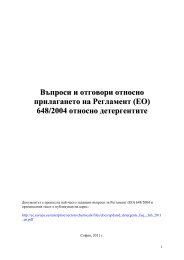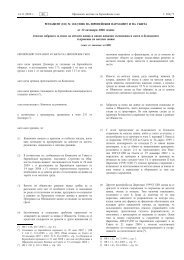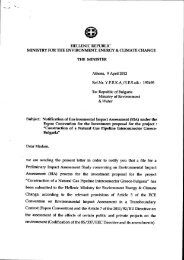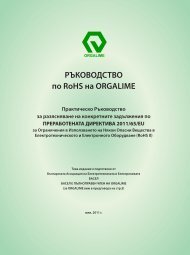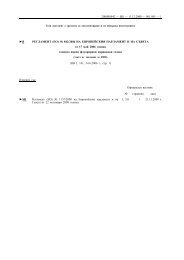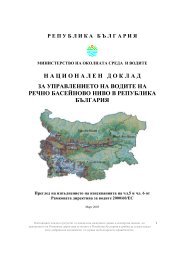Програма на научната конференция - Министерство на ...
Програма на научната конференция - Министерство на ...
Програма на научната конференция - Министерство на ...
- No tags were found...
You also want an ePaper? Increase the reach of your titles
YUMPU automatically turns print PDFs into web optimized ePapers that Google loves.
както и <strong>на</strong> специфичните подправки, които хората използват. Тяхнотовнимателно проучване разкрива и редица устойчиви селскостопанскипрактики, които пък са позволили съхраняването <strong>на</strong> природните екосистеми.Поради спецификите в развитието <strong>на</strong> селското стопанство в България, днесуникални храни са запазени главно в планинските и полупланинскитерайони, които пък в повечето случаи са и територии със запазено богатобиоразнообразие. Мощен стимул за запазването <strong>на</strong> кули<strong>на</strong>рните традиции у<strong>на</strong>с е развитието <strong>на</strong> различни форми <strong>на</strong> „зелен” туризъм, при койтотипичните за дадено място храни са неуспорима притегател<strong>на</strong> сила затуристите. Наред с природните забележителности и редките видове растенияи животни, туристическа атракция може да бъде и прибиране <strong>на</strong> реколтата отемблематич<strong>на</strong> култура (<strong>на</strong>пр. Смилянски фасул) или приготвянето <strong>на</strong>специфич<strong>на</strong> с даденото място хра<strong>на</strong>. От 2004 г. България е част от светов<strong>на</strong>тамрежа <strong>на</strong> Slow Food (бав<strong>на</strong> хра<strong>на</strong>). Slow Food е световно движение, коетовъзниква в Италия и изповядва философията, че хра<strong>на</strong>та трябва да бъдевкус<strong>на</strong>, да е произведе<strong>на</strong> в синхрон с природата, производителите й даполучават справедливо въз<strong>на</strong>граждение за труда си.SLOW FOOD IN BULGARIA OR HOW GASTRONOMIC TRADITIONSCONTRIBUTE FOR THE SUSTAINABLE DEVELOPMENT OF LOCALCOMMUNITIES IN AREAS WITH RICH BIODIVERSITYD. DimitrovaInstitute of Botany, Bulgarian Academy of Sciences, Acad. G. Bonchev Street,Bl. 23, Sofia 1113; E-mail: dessidim3010@gmail.comBulgaria is rich in diverse natural resources and culture. The gastronomic traditionsare the quintessence of the lifestyle of the local communities. The food of a certainarea brings its taste and aroma that stem from the local varieties and breeds and thespecific herbs that people use. A careful investigation of this food reveals alsosustainable agricultural practices that have resulted in the preservation of naturalecosystems. Due to the specificities of the development of agriculture in Bulgaria,today unique food is sheltered in mountain and semi-mountain areas that aremostly with preserved rich biodiversity as well. “Green” tourism is a powerfulstimulus for the safeguarding of the gastronomic heritage of Bulgaria. Local foodis undoubtedly a powerful attractant for the tourists. Together with enjoying naturebeauties, rare plants and animals tourists can participate in the cultivation of aspecific plant variety (the Smilyan beans for instance) as well as in the preparationof a dish typical for a certain place. Since 2004 Bulgaria is a part of theinternational network of Slow Food. Slow Food is an international movement thathas originated in Italy. Its philosophy is that food should be “good” (it should tastegood), “clean” (its production should not harm nature) and “fair” (its producersshould receive the fair price for it).72



